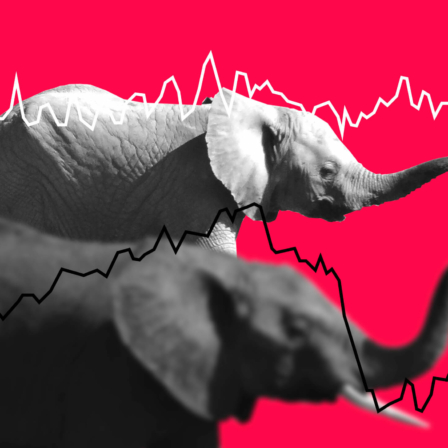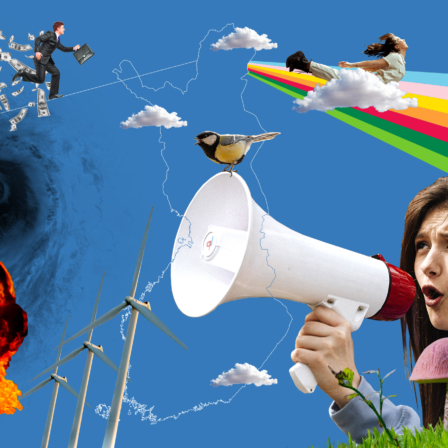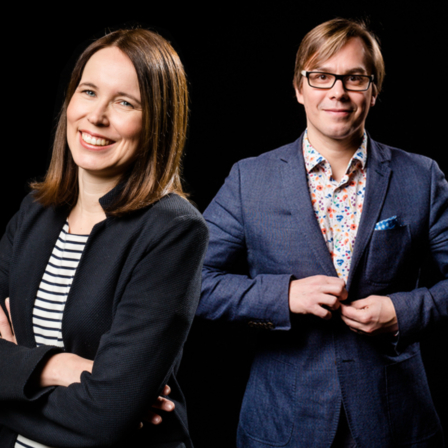Foreword: From the pause to opportunities
Economies all over the world are in the midst of many great changes and uncertainty.
Most importantly, digitalisation, globalisation and an ageing population will break the traditional connection between growth, productivity and well-being in an unforeseen manner. Political leaders all over the world struggle to grow the economy, increase exports and create new jobs. A higher employment rate in paid employment is a generally accepted goal. In 2017, politics is still founded on the idea that increasing labour in the market results in growth.
In this paper we argue differently. Digitalisation, globalisation and ageing seem to be breaking the connection between growth and well-being.
This article was triggered by the contemporary experiences of the authors. We were tired of hearing economists talk about how necessary growth and productivity are for well-being. We don’t believe in this story any more.
Digitisation and globalisation seem to be breaking the connection between growth, productivity and well-being.
Digitisation and globalisation seem to be breaking the connection between growth, productivity and well-being. As a consequence, many of the professions existing today will see a drop in the number of jobs, or will cease to exist altogether. There are many different estimates on to what extent, and how soon, professions will disappear and replacement jobs will be created. We are also aware that technological change has, in the past, often prompted wild predictions about the disappearance of jobs, but ultimately the number of new kinds of jobs arising from unexpected directions has been greater than those lost.
Occupations related to a physical work input and production of goods are likely to continue to exist in the future, but the digital transformation will change the job descriptions even in these occupations.
It seems clear, however, that value creation and people’s income will, in the future, be based less and less on the production and consumption of goods — and more directly on the activities and interaction of people. This is the most significant societal impact of current techno-economic development.
The article will compare the present with the industrialisation that began in the 18th century. The Industrial Revolution was a comprehensive technological, cultural, social and economic change process, and, as a result, the basic mechanisms and default values in society had to be redesigned. A similar transformation is now taking place across the industrialised Western countries. The word “pause” in the title refers to the so-called Engels’ Pause: according to historians, at the beginning of industrialisation, the technological transformation first reduced the income of the populations for decades, although societies became wealthier in the long term. The 2010s can be seen as the beginning of a similar “pause” in Western countries. With the right kind of politics, the decline in income caused by the transformation can, however, be smoothed and the rise from the ‘bottom’ speeded up.
Our approach to this topic is one of foresight: we want to look into the future and start a conversation about different options and their desirability. For it is precisely in those kinds of situations that policy decisions and peoples’ choices matter, and therefore require planning ahead.
Unfortunately, mainstream policies in Western societies are based on the operating models of the industrial age and, as such, can no longer secure the growth of well-being in this new technological and business environment. This is seen in both the political destabilisation and in the failure to create growth above the average. New policies are required for the digital age.
Digitalisation opens new opportunities for everyone to produce value and make a living.
In spite of these challenges, our message has a positive tone: digitalisation opens new opportunities for everyone to produce value and make a living. And even more value and an even better life than previously. Perhaps it is called ‘work’, perhaps ‘play’, here it would be stupid to be normative in the long run. Work itself is a product of a certain historical era. However, value creation is never limited to paid work or commercial transactions.
Taking advantage of this emerging opportunity, however, requires radical changes in the present ways of thinking that emphasise growth and productivity. Above all, the approach of this article is a forward-looking one. Hence, the major part of its content is about new solutions.
Helsinki, 5 December 2016.
Antti Hautamäki, Juha Leppänen, Roope Mokka, Aleksi Neuvonen
1) The New Engels’ pause
Digitisation breaks the boundaries between industries, exposes companies and organisations to the global innovation competition. Digitisation is a bigger issue than a regular technological update. According to many commentators, as an economic and societal change, this transformation is comparable to the Industrial Revolution that started in the 18th century. The exponential capture of information in a digital form, abundance in processing capacity and increasing technological hyper-connectedness already challenge the way western developed democracies operate politically. The dramatic increase in popularity of the Conservative populists has occurred particularly in the regions suffering the greatest job-losses.
Since the late 1980’s, information technology made it possible to automate production and split the production chains into global value chains. Traditional job descriptions disappeared and the number of industrial jobs declined in the West. In the past ten years, a huge number of jobs have disappeared from the media, music business and banking services, for example. Many traditional companies in these industries are struggling to survive. The next industries to undergo the transformation will be education, the retail trade, transport, the consulting business, healthcare and accounting. Any work that is based on routines is increasingly facing automation. These jobs account for about half of all current jobs in the West.[1] Digital companies’ production capacity per employee and customer base is often manyfold compared to traditional companies in the same market.
The change is not limited to individual industries or groups of employees. It is a question of a much larger societal transformation. A clear historical point of comparison is the transition into the industrial society about two hundred years ago. A common misconception about the Industrial Revolution that started in Britain is that wealth increased almost exponentially.
In reality, the industrialising societies experienced a period of several decades during which many people lost their jobs and income before it was possible to take advantage of the benefits of the new technologies and methods of production. Historians refer to this time period as the so-called Engels’ Pause: a time period during which a greater than usual technological development weakened the income of the population. The West now sees an analogous situation in which many traditional occupations are being replaced by digital or automated solutions. The word “pause” also refers to the societal horizon of expectations, in which a large number of people no longer have the prospect of being better off than the previous generations.
Our main claim is this: like the Industrial Revolution, it is not only the nature of work, enterprise and economy that is changing, but entire society is undergoing both a rapidly unfolding and also potentially long and painful period of transformation. During industrialisation, productivity started to grow when the pillars supporting society and business were redesigned according to the new operating practices. Several societal innovations were scaled up and new institutions were created to scale them. This started an unforeseen period of growing prosperity. At the same time, two new social classes were born: the working class, whose living conditions much of the politics during the 20th century strove to improve, and the middle class, the growth of which was one of the most important results of the increase in prosperity started by industrialisation and political reforms. Similarly, both the birth of the party system in its current form and urban planning can be dated to the beginning of industrialisation. Techno-economic change was followed by an unforeseeably creative time in social innovations.
Now, many of these institutions are collapsing. One of the central phenomena in this current development appears to be the decline of the status of the familiar social classes. One of the first victims of the globally networked economy was the working class in the West. It lost its well-paid, stable work. The digital transformation is now reaching further and further into the middle class: the traditional well-paid jobs that required a long education are disappearing and similar jobs are not immediately appearing to replace them. Simultaneously, the extremely low price of sophisticated digital tools, services and entertainment also blurs the lines between the social classes.
We believe that it is possible that digitalisation and robotisation has started a decades-long period of transformation rightfully comparable to the Industrial Revolution.
We believe that it is possible that digitalisation and robotisation has started a decades-long period of transformation rightfully comparable to the Industrial Revolution. We may be entering an era during which the basic structures of society will shake, the forms of income will change, and wealth will be radically redistributed with new policies and criteria. Modern people are likely to know as little about the future social system as people at the beginning of the 19th century could imagine how ordinary working class people would one day be able to fly across the oceans in aeroplanes, children of working class people become presidents, or similarly successful doctor-fathers cook potatoes and then change their babies’ nappies.
The three big open questions regarding the change that is underway are the following: to what extent will new kinds of jobs be created, what kind of means of subsistence will they offer, and how widely will the digital transformation of industries change the structures of owning and income distribution?
The politics of the next few years will either succeed or fail to find a solution in terms of how societies can hold together in spite of the big transformation. The experience of the Industrial Revolution also gave rise to revolutionary ideas, many of which turned totalitarian in the coming decades. Thus, how a meaningful life can be built for everyone, not just for the elite of the digital economy, is an urgent question, and not something we can wait to answer.
2) The logic of radical change — why is everything changing now?
The biggest reason for the change currently underway is that new technological solutions have reached a mature stage. This has led to the broad-ranging digitalisation and automation of many industries. In addition, globalisation is speeding up the change in the economy. A third big factor is the big demographic change. The world is therefore not what it used to be, nor are old policies valid for building growth and well-being.
The radical change in the economy can be summarised as follows: economic value is created in global networks, instead of capital-intensive, corporate and state structures. The biggest societal impact of this change is the separation of economic growth from maintaining well-being. Economic growth no longer creates new jobs at the same pace it used to. Furthermore, its fruits are, in many countries, distributed more unevenly than in the past few decades. This is all related to what has been our understanding of how economic growth is created. The traditional formula
economic growth = increase in work input + increase in productivity
only explains how economic growth is calculated, not how it is created. Additionally, the conditions for increasing the amount of work and improving productivity have changed dramatically. Productivity only measures the ability to change the input of production into monetary value, not how efficiently the input is changed into benefits or well-being.
The techno-economic change that is currently underway might have resulted in less growth, due to the degradation of the price mechanism. In other words, it resulted in cheaper prices for many commodities, and many services have even become free for the users. Additionally, the expansion of digital communication has also created a whole new layer of co-operation between people outside the markets, and this co-operation is not visible in the figures describing production. An example: if there was a need for a photograph for illustration purposes in our near past, it had to be bought, whereas now it is possible to get it free of charge using the Creative Commons licence. Wikipedia has largely destroyed the commercial market of encyclopaedias and, because Wikipedia does not have advertisements, a huge gap of billions of Euros forms in the advertisement market thanks to it.[2] Thanks to this development, the role of productivity and economic growth as indicators has changed and will change. Fundamentally, the transformation of the economy is about a radical change of the conditions of value production.[3]
The main factors of change are globalisation, digitalisation and demographic change. In the background, the next big factors of change are already having an effect in some places: the scarcity of natural resources and the limits of the carrying capacity of the environment.
Globalisation broke down value production and deepened the distribution of work
The expression “The jobs are moving to China” has become a truism. The most visible and dramatic effect of globalisation has been the disappearance of industrial jobs in the developed industrial countries and conversely, the creation of jobs in developing countries. Globalisation is characterised above all by the interdependency of the world economy and the mobility of resources across the borders. For example, the housing bubble and resulting financial crisis in 2008 triggered a wave of changes that soon spread to a large area. The dependency can also be seen in how the slowdown of economic growth in China is reflected in the price of, say, raw materials and oil.
In the global economy, capital, goods, services and people can move more freely. This leads to a new kind of optimisation of oversees’ investments by companies. Mobility has been enhanced with many international agreements from the European Union to the World Trade Organisation WTO. Consequently, it is now easier than ever before for companies to locate their operations to places in which it is most affordable for them. Industrial production is located in developing and development countries, which have cheap workforces and often lax environmental regulations and which are surrounded by large, growing markets. The other extreme is the nominal headquarters in tax havens or in financial centres with light taxation, like Luxembourg. Strategic operations such as design and product development, on the other hand, are located where the best experts are available. As a result of this optimisation, companies’ direct investments abroad increase, but new jobs are not necessarily created in their home countries.
Big multinational and transnational companies that operate in several countries and expand in networks have been the key factors in globalisation. In the words of Thomas L. Friedman: globalisation makes the world flat.[4] The whole world is open and companies can operate everywhere, produce and acquire things where it is most profitable, and sell where the best markets are. However, globalisation takes place through urbanisation, and the population and wealth piles up in large metropolises. The global world has also been called spiky because, for example, patents, innovations and start-ups are concentrated in very few centres.[5] Economic piling up is proved by the fact that there were about 1,600 billionaires in the world in 2014, and that the richest eight people in the world (with a combined income of $426 billion) now own as much as the poorest 50 per cent of the world’s population, according to a report by Oxfam published in January, 2017.
Certain geographical areas specialise and accumulate relevant expertise: the Boston region is one of the leading centres of medicine and biotechnology, and Silicon Valley is specialised in digital services and platforms. Globalisation leads to a deepening division of work that will gradually reach the level of task structures: each task can be outsourced to those who do it best. A considerable part of the value of highly processed products is divided between several countries and operators.[6]
It is noteworthy in that the share of assembling devices, which is typically perceived as production, remains marginal in the entire value chain.
So what value do the factories create in the global economy? It is noteworthy in that the share of assembling devices, which is typically perceived as production, remains marginal in the entire value chain. The highest added value comes from the planning, design, marketing and business administration that takes place in the developed countries. An increasingly small proportion of the value of the company or its sales returns to the manufacturing workforce as wages.
Globalisation cannot be regarded as a negative phenomenon. It unifies the world economy, opens up huge markets and creates a huge expertise potential. Globalisation causes creative destruction, in which businesses whose profits are weak are replaced by businesses that are more profitable. Globalisation has brought down the real costs of the work unit and, at the same time, increased the size of the world economy. Globalisation has lifted hundreds of millions of people out of poverty.
Nevertheless, developed countries keep facing big challenges. The integration of developing economies into global markets has brought a large group of workers to the labour markets, low-paid workers by global standards, against whom the workforce in developed economies has to compete. To do well in this competition, developed countries must focus on the production and utilisation of intellectual capital through new technologies, skillful branding and insightful services. Success requires an ability to operate in global value networks, so that the company’s own expertise and strengths are combined with other global expertise that best complements it.
Globalisation is also a huge political challenge to nation states. The states’ capability to steer their economies and influence the societal development by means of taxation, for example, is diminishing. Nation states have been drawn into a tax race with each other because it is easy for large companies to move their investments and jobs to the most attractive countries. The objects of taxation have become slippery: companies transform or move to a different country to minimise their taxes. Because capital is increasingly difficult to tax, stricter taxation of real estate, land, natural resources or emissions is now being discussed as a response to it. At the same time, more and more of the challenges states are facing, from climate to immigration, extend across state borders.
People’s mobility is still relatively low in comparison to the mobility of the other production factors, for example, capital and raw materials. The mobility of the population is visible especially as urbanisation and migration within states. Large cities joined by globalisation and their metropolitan areas form a uniform structure in which people and ownerships often move more seamlessly than between cities and the national periphery. Large urban areas may be as influential as some of the nation states.
Culture is also undergoing a fundamental change. Globalisation standardises thinking and operating models everywhere, creating a global elite that can operate in a global world. Correspondingly, the differences in how the world is experienced by different groups of people within states grow. Some of the population finds their reference group more globally, and the importance of national culture and institutions declines. The cultural gap between metropolitan areas and rural areas widens.
The global income distribution is very extreme. Although globalisation has increased prosperity across the whole world and lifted hundreds of millions of people out of poverty, it has also destroyed traditional sources of income and caused big changes in societal structures, especially in the global south.
Globalisation has also become a central cause for concern for the working population in industrial countries. As a consequence, protectionism and requirements for the protection of domestic jobs have again emerged in the political discussion. This has created a ground for nationalist and populist movements and parties. The destruction related to competition that has been accelerated to extremes by globalisation is difficult to face if resistance to change grows and we cannot make the necessary structural changes. The Brexit decision in Britain and Donald Trump’s rise to the presidency in the United States are recent examples of this.
Digitalisation will change the foundation of the economy
Digitalisation speeds up globalisation and enables a new financial logic that is based on networked organisations and information as central factors of production.[7] It has created automation and robotics, which increase productivity and reduce the need for human labour. Digitalisation has profound effects on the economy and society. The terms of working and the nature of work will especially change.
Digitalisation is characterised in particular by:
- The explosive growth of data and information (big data)
- The Internet of Things and connecting an increasing number of devices to the network
- The emergence of a platform economy based on cloud services
- Expanding use of automation, robotics and artificial intelligence to replace human labour
The technology that digitalisation is based on develops very fast, even exponentially. Computers are increasingly efficient and small, and data moves faster and faster. Software keeps developing and “eating the world”. Algorithms developed particularly for processing different complex, large materials have increased the use of information technology in decision-making. Algorithms already govern almost all functions in the digital world, from intelligent electricity networks to stock exchanges, and to the extent that people have started to talk about an “algorithm revolution”. That is far from true given the possibility for algorithms to now independently learn, i.e. to develop themselves.
In the past few years, the amount of global data has grown exponentially. The capability to process this big data has become a business sector of its own and a necessity, not only to the well-known examples Google, Facebook and Amazon, but also to banking companies and marketing research institutes. The big promise is in everyday things however: it is hoped that big data will help make the promotion of health, energy production and transport more efficient.
The current wave of digitalisation is related to the digitalisation of the physical environment: sensors transmit information about the human body, homes, transport or air quality to devices and servers. The Industrial Internet has made remote steering and servicing of devices a new industrial service. Wearable intelligence has already become a significant promoter of health, as it provides the person wearing it with exact information about the heartbeat, the quality of sleep or the amount of physical strain.
In the digital age, production is horizontal and based on co-operation, which does not require large amounts of capital in the beginning
For businesses, digitalisation enables the dismantling of hierarchies and the moving to networked production methods. In the industrial age, the economy was led by large, hierarchical corporations. Large amounts of capital were needed in production, and the state supported companies in accumulating them. In the digital age, production is horizontal and based on co-operation, which does not require large amounts of capital in the beginning. Instead of large hierarchical companies, platform operators take the role of coordinators.
The platform economy is reshaping the terms of business: it will create a new level of suppliers between the services and the customers, by removing the middle men with integrated services. The most well-known example of this is the transport service Uber. The new type of taxi drivers, who own their cars, operate using its platform all over the world, and Uber charges a certain percentage of all fares charged. A recent example is the transfer of customers’ banking transactions to providers of one-stop services and one card, in which case the customer is no longer in direct contact with the bank. And more generally, fintech, the new technology in the finance business, will in future break the entire finance sector, from consumers’ mobile charges to investment analyses.
Digitalisation provides unlimited possibilities for scaling digital products and services. One game can be downloaded millions of times without the producer of the game incurring any additional costs. “The winner takes it all” in the digital economy. This means that whoever manages to scale their services fast and before the others, will essentially control the entire market. The best example is Google, which was the first to create an easy to use and comprehensive search engine. On the other hand, accessing the markets is easier in the digital economy, and as a consequence, new entrepreneurs will appear fast and old enterprises may disappear just as fast.
The effect of digitalisation on employment is one of the most important questions of our time. Earlier transformations of technology have destroyed jobs and whole occupations, but also created new jobs to replace them. Often these new tasks have required better education and the reward for them has been higher. The big question is this: is the digital revolution an exception to this rule?
In his book The Rise of the Robots, Martin Ford claims so: digitalisation will destroy a huge number of jobs in almost all sectors. According to Ford, all routine tasks and predictable tasks will be automated. For example, the share of industrial workers relative to the entire workforce in the United States has fallen from 30 per cent to 10 per cent since the 1950s.[8] Now the workforce is disappearing from routine services such as fast food chains, in which robots make the products automatically according to orders.
It was long thought that knowledge work would continue to be necessary and hold its value. However, as computers become capable of processing large amounts of data and learn from the data, machines will become more and more intelligent and capable of doing the work of the advisers. IBM’s Watson, a system that uses artificial intelligence, is already able to make better analyses than a human being when diagnosing illnesses or complex financial data. Artificial intelligence systems are a serious competitor in advisory work in the field of economics, law, administration, teaching, media and healthcare. It has been estimated that half of all current work tasks will be automated within the next twenty years or so.[9]
Yet conversely, digitalisation also creates new job markets. Work related supply and demand can meet through different service platforms. Supply services are available on the Internet for almost all types of work from cleaning (Freska) and home services (care.com) to translation (Lexitec). Entirely new job descriptions and occupations will also emerge which take advantage of the work input of digital tools and robots and increase the value of their input. New work tasks will also be created via the possibility of making the collaboration and distribution of work between people more seamless than before with the help of machines.
Digitalisation may at best be a central way to create a leap in resource efficiency, and in that way, also reduce the pressure on the environment.
New jobs will be created, but their creation is more difficult to track than the loss of old ones. It is also possible that fewer new jobs will be created in comparison to the number of disappearing jobs. Furthermore, these new jobs will often be created in low-paid sectors. Regarding the entire ‘big picture’, however, digitalisation may at best be a central way to create a leap in resource efficiency, and in that way, also reduce the pressure on the environment.
Demographic shifts will change the dynamics of culture and the economy
Alongside globalisation and digitalisation, a new type of demographic change is challenging our society. Birth rates have long been declining globally and this has already slowed the growth of the global economy. People are most productive at work between the ages of 15 and 65, and when the population is young, creativity and the formation of new lifestyles creates unique social and economic dynamics.
A large number of young people who are entering adulthood usually means an increase in consumption. Young adults buy new homes and cars, and need new suburbs for their homes, and new day-care centres and schools for their children. They also bring a supply of work to the markets. Between the 1950s and the 1970s, thanks to the baby boom generations entering adulthood, the cake in the West was growing. Every year everyone got wealthier, the annual increase often being measured by dozens of percentage points. At the same time, it was possible to reform production structures and increase productivity.
As mentioned earlier, the simplest way to calculate the potential of economic growth is to multiply the amount of the future workforce by productivity. Between 1960 and 2005, the total global workforce grew by 1.8 per cent every year. Today, the growth of the workforce has fallen to just over one per cent per annum and continues to fall.[10] As education and wealth become more common, the birth rate declines in almost all cultures.
The world’s population continues to grow, but the number of young people, the most creative part of the population, is not growing. The population is growing because people live longer. According to population growth projections, more than one third of the population in most large economies, such as in Europe, China and the United States, will be pensioners, or people over the age of 65 until 2050. This has usually been referred to as the declining dependency ratio: a weaker ratio of income tax payers to pensioners. Few of us can or even dare to think about the cultural and other dynamic effects of an ageing population. Making reforms in society will definitely not become easier. At worst, we will be facing a society of cultural old age, an inflexible society governed by traditional structures. On the other hand, older people do not generally form a coherent group that will univocally resist changes.
Global Institute, the research department of the consulting firm McKinsey, has estimated that half of the global economic growth in the past 50 years was due to technological development and half to the increase in the workforce.[11] Now that population growth will reverse in the next 50 years and the increase of the workforce even before that, we need an unforeseen leap in productivity. According to McKinsey’s estimates, if we want to maintain economic growth at a global level, the growth of productivity should be 80 per cent faster than earlier in history. And as we noticed earlier, low-priced commodities and commodities that are partially free reduce productivity.
Furthermore, if we look at demographic changes on a smaller geographical scale than countries, there is growth. We can then see the continuing urbanisation in common with several countries. The population grows in large university towns and in their vicinity thanks to both birth rates and migration. In addition to the workforce, productivity also grows in cities: innovations are created in densely populated areas, apparently because diverse expertise is widely available and different kinds of people encounter each other easily. New jobs that replace the disappearing occupations will probably be created more slowly in the countryside and small towns than in the growth centres that attract new expertise and business
3) The rise and fall of employment politics
Most countries’ economic policy has been based on the teachings of the economist Robert Solow[12], according to whom growth is based on an increase in the productivity of work enabled by technology, and on the other hand, on the availability of the workforce. Solow’s explanatory model is fascinating as is seems to explain, for example, why there was such a huge economic boom in the 1960s and 1970s, and why growth has slowed down after that. Solow’s teachings still hold true, as a model, but can no longer provide the basis for governments trying to increase employment. The overall picture is not as simple as Solow’s model makes us believe. Better productivity has been sought, both by reducing the costs of the workforce (by reducing the workforce or moving production to areas where the wages are lower), and by supporting innovations and education. Governments have made considerable investments in both education, and research and innovation activities, in particular. The best and most effective years of these investments in expertise are, however, behind us. In the past few decades, even generous investments in education and innovations have not helped create a similar improvement in productivity as was evident in the past.
The overall productivity may grow, but its fruits will be distributed unevenly and growth will not necessarily create more jobs.
Because we are experiencing a big technological and demographic change, we don’t yet know what will be the appropriate variables for describing the amount of human activity, the effect of technological development and the value created from these in the future. We already know that as a consequence of the combined effect of globalisation, digitalisation and demographic change, the old recipes will no longer work. The overall productivity may grow, but its fruits will be distributed unevenly and growth will not necessarily create more jobs. The ability of public institutions to even out the benefits by means of traditional economic, industrial and social policies will decline. Therefore, an increasing number of people see new innovations and solutions as a threat rather than as a positive economic and societal development.
We should consider what should be done if a still considerably larger number of jobs disappear as a result of the digital transformation, and new jobs are born with a delay of decades, after “Engels’ pause” mentioned at the beginning of this article. What will happen to societies when robots take over warehouses, and vehicles move without drivers, when there are no shops, or shops have no checkouts, and when more and more office tasks can be processed using complex algorithms?
As a result, it is difficult to build a promise about the capability of politics to widely enhance people’s well-being, at least not only with those political tools that were used to build the welfare states at the end of the 20th century.
The west and western companies are struggling in the ever more challenging global competition, in which capable competitors with lower costs increasingly enter the markets. The current demographic development stage does not provide growth either: there is an increasing demand for homes and other basic commodities only in a few growing regions, and the available qualified workforce is not growing significantly.
The way digitalisation will change society is not only a technological question, but a political question.
The way digitalisation will change society is not only a technological question, but a political question. Digitalisation will increase the productivity of many things in considerable leaps (even if this productivity increase is not necessarily captured by the price mechanism). Whether this will be used to make everyone’s life easier and to create new opportunities for an active citizenship and work, or to maximise the profits of a shrinking economic elite and to eliminate work, is a political choice.
As we look at the future in front of us in the next two to four decades, it is possible to create two extreme scenarios based on the current discourse. The purpose of these extreme scenarios is to reflect upon the central fears and expectations of the current discourse.
Polarisation scenario
Globalisation distributes wealth unevenly between countries and within countries. The uneven distribution of wealth can be seen in the polarisation within industrialised and industrialising countries. Well educated people who are in leading positions in society and the economy will have a comfortable life. They can enjoy the falling prices and increasing supply that follow globalisation. The majority of the middle class feels that they are the losers in globalisation. They live in constant uncertainty about their jobs and income. Inequality erupts as discontent, unrest and hostility towards immigrants, and as nationally inward-looking views. The wealthy elite is concentrated in protected residential and business areas. The majority of the population struggles in dilapidating towns and cities or on the periphery.
Abundance scenario
The costs of material production and energy production fall, making it possible, in principle, to provide the necessary infrastructure free of charge. Thanks to information technology, automation and robotics, the efficiency of production increases in a way that has never been seen before. With the help of the new materials technology, products can be made that will practically never wear out. The technologies used in collecting solar energy improve fast, and their prices fall, securing unlimited availability of energy free of charge after the initial investments have been made. People no longer need to work to earn an income, not to mention toil in challenging work tasks. They can use their time for personal development and engage in community life, create science and art, engage in physical activity and love. A time of abundance will follow.
The central claim in our article is that the above-mentioned changes that have taken place in the structures of production and working in the past few years, are possibly revolutionising the organisation of the whole society, and our ways to steer society is with the help of politics. It is not a question of a change that could be steered at a national or, say, European level by means of industrial policy, for example. Nor is it a question of just terms of work, income or ownership. They are all changing, but many other areas of society around them will also fundamentally change.
There was little accurate data on change in the 19th century and politics was largely based on educated guesses. For a long time, there was a debate about whether industrialisation would increase productivity or impoverish society. People could not discuss the actual growth, as the indicators for it were not invented until the 1930s in the United States. Today, in the 21st century, things are different. We have an unforeseen opportunity to reform society significantly faster than in the previous “pause” experienced in both the economy and in well-being. However, this requires that we recognise the wider picture of the change. People in workplaces, businesses, politics as well as in homes, must discuss what this new development stage, and the period of stagnation we may be facing as part of it, may mean.
4) How to press play again? Can society and the economy flourish in a digital age?
No one knows the whole form or all the consequences of the wide-ranging societal changes as yet. At the same time, an honest analysis of the operating environment enables us to make educated guesses. Yet growing discontent in politics is forcing us to provide more forward-looking narratives about the future.
We propose a smarter way of using society’s existing resources and a new more experimental state. All in all, the technological and business innovations require the scaling up of societal innovations to support human wellbeing and growth in the digital globalised era.
Next, we will introduce a series of actions and societal innovations that societies with a strong democratic foundation and high levels of trust can use to build bridges across the transition. These are initiatives that help retrieve new value from old strengths and, at the same time, create room for building new strengths in different areas of society. There are political instruments for supporting them and with these instruments it is possible to create a visible change in a few years. But, we also have to remember that the instruments, as such, will not carry the whole society across the “pause” created by this new age. More than one-off changes are required over a long period of time.
We suggest two new strategies for managing the transition. The first one is an economic one: it recognises that there are still many unused resources in our society and we can use them to both create financial value and increase well-being. We want to make the idle “assets to go to work”. Secondly, we suggest that society in the digital age requires a public administration that boldly engages people. The tools of this administration must be diversified and experimentation must be promoted, because rapidly spreading innovations and the increasing diversity of society make it impossible to anticipate how something new should be governed.
Leverage all assets — efficient and creative use of current resources
One of the biggest promises of the digital transformation is the promise of the ever more efficient utilisation of assets. People, towns and cities, and companies have numerous dispersed and underutilised assets. They may be material possessions such as objects or real estate, or intangible resources such as networks, expertise, or data that exists in registers and databases.
We need an entirely new way of thinking about the leveraging of assets.
Digital tools create new ways to make use of these resources. New business models and service concepts enable new economic activity and strengthen people’s participation and well-being. In our opinion, we need an entirely new way of thinking about the leveraging of assets. With digitalisation, asset management can now become real time through co-production, the sharing economy and new intelligent infrastructure solutions.
1. Co-production
With the industrial age coming to an end, interest in services has grown. Service productivity, and more recently service impact, are often seen as the biggest sources of new economic growth. One of the key questions in this debate is related to the role of the service user in the service production chain: is the user an active part of the production of the service or does the user just receive the ready-made commodity?
Co-production is an approach in which services are seen specifically as results of co-operation between the producer and the user. This is based on the understanding that the user is often in a key role regarding the success and impact of services. The purpose of services is to enable the user to engage in activity that depends, to a large extent, on the users’ motivation and skills, such as learning, recovering from an illness or injury or enjoying something. Therefore, the user and the user’s experiences, wishes and insights should be included in the service production, from determining the starting points for the design work, to the actual service situation.
The digitalisation of services makes the role of the user even more visible, with an abundance of data from the service transaction. The producer of the service obtains data directly from how the user uses the service, the dialogue between the user and the service producer becomes easier, and communication and co-operation between users becomes simpler. This provides huge opportunities to redesign services and increase the effectiveness of education, as well as health and social services.
In the past few years, co-production and a user-oriented approach have spread to companies and public services primarily as service design. The service industry has largely emerged during the past ten years. Through service design processes, different organisations, from banks to municipal social services, and from pharmaceutical companies to companies providing rented housing, have started to build their services not just from the point of view of the user, but often together with the user.
2. Sharing economy and local economy
The basic idea of the sharing economy is to enable the sharing between people of typically underutilised assets — vehicles, houses and flats, equipment for hobbies or design objects. This increases the efficiency of the entire society both by utilising unused resources and by speeding up trade and exchange.
For example, in Finland, where the writers are from, people are used to practically all goods and services being exchanged through the official markets via companies or public services. The share of the informal economy in Finland is smaller than on average. For example, the peer economy around the Mediterranean is considerably larger and, correspondingly, the tax base is more narrow. Still, many (perhaps a growing number of) societies currently hold together partly thanks to a strong local exchange. The local and sharing economies offer alternative sources of income, especially when the economy that relies on companies is in deep recession. The local and sharing economies may even smooth out the rise from the “pause”, for example, by bridging gaps between incomes or by helping to make use of the resources and expertise more broadly.
However, unless we can tax the sharing economy in a comprehensive and efficient way, this route is currently problematic for our public economy and the welfare state. The services of the sharing economy are already altering the consumer markets in many fields. The new market for second-hand goods lengthens the life cycle of products and provides an income to people. The Finnish web-company Swap.com is the biggest supplier of second-hand children’s clothing in the United States. The different ways to share cars, houses and flats, and equipment used in hobbies change the way people own things. Through Airbnb, it is possible to make one’s own house or flat, or part of it, available to rent at times when it is needed less, and car sharing services free people from the need to own a car and have it serviced. The Finnish company Sharetribe, on the other hand, provides a digital platform for hundreds of hobby groups through which people can lend and rent out equipment and provide tutoring and coaching services for peer learning.
Sharing one’s own expertise online is one of the latest trends in the sharing economy. For example, translators, lawyers and teachers can offer their services in the new sharing economy platforms and earn an income. It is also possible to sell time. Networks such as Care.com already exist for dog walking services.[13]
3. Smart City
The infrastructure and building stock of cities can be characterised as being extremely complex and requiring considerable expenditure to run. For the maintenance and development of cities, the public sector bears the main responsibility. If the city infrastructure is not optimally functional, traffic in the city gets congested and the quality of the nearby environment declines, which also makes the city less attractive and erodes its economic success. The quality, usability and safety of the city environment can be significantly improved by digitalising the city infrastructure and building different Smart City solutions around it. With Smart City projects, whole new markets can be opened to digital solutions and the companies offering them. In this way, it is possible for cities to use their own steering methods and services (waste management, energy, transport, construction and safety) to create new business that also responds to their growth challenges.
Smart City initiatives combine the goals of many different policy sectors. The idea behind the initiatives is about boosting business activity, transport solutions, protection of the environment and even preventative healthcare. Resources for Smart City initiatives have therefore now been allocated from a level significantly higher than the city authorities themselves. The White House Smart Cities Initiative in the United States steers the financing of Smart City pilots in a rather exceptional way from the federal state directly to the cities.[14] The European Union also has numerous ongoing Smart City initiatives. A good example of concrete Smart City activity is the design process of the new buses in Barcelona: the routes, stops and timetables are determined by use.
4. Open data
One of the most important consequences of the digitalisation of society is the enormous amount of information that is created both by the activities of individual people and the operation of society as a whole. What is the best way to utilise this vast new resource? This data offers significant potential in terms of planning future solutions and dissolving many difficult problems across all sectors and around the world.
Interest in the generated data grows as its amount grows at an increasing pace. However, the questions about how legislation is used to govern the ownership of data and right of possession of data are still largely ungoverned. For example, what are people’s access to, use of and ownership rights to data generated through digital devices, services and state interactions?
The value of data will increase further if the data produced by individual organisations can be combined to larger masses of data: into ‘big data’. At the moment, data often remains the property of an individual operator, such as one company, a specific city agency, platform or service provider. Most operators’ capacity to take advantage of their data alone is limited, whereas combining it with other actors increases its value.
In the past few years, open data initiatives have especially encouraged public organisations. Open data means that an organisation shares its public data in a machine readable form (through API). Cities and other service providers share their data and offer it to others in a form that is easily available and processed.
Open data supports the so-called ‘citizen science’. People have access to many open data banks and can use the data to solve problems. They participate, for example, in the interpretation of pictures of galaxies in the field of astronomy, or generate data by reporting the state of the environment in cities.[15]
Experiential governance for the age of complexity
Although the political atmosphere has become more polarised in the past few years, voters at large still ostensibly trust public institutions. This opens an important opportunity in a time that requires investment from both the public and private sectors. Public administrations are now being changed to create room for experimenting. Instead of speculating on the impact of proposed policies, some states and cities now experiment, measure and scale.
Large scale and even universal policies such as basic income must be experimented with, in order to understand the consequence of such massive changes in public spending, its impact on markets, people and communities.
1. The new taxation and income distribution model
Paid work is not the only significant way to produce valuable things for society. The income distribution system cannot therefore be based entirely on benefits linked to paid work, either. An updated version of universalism could provide everyone with a basic-level financial freedom to develop ways to make themselves useful and earn their living. This would improve people’s ability to build their income by combining different income sources such as work, entrepreneurship, the sharing economy and even a barter economy.
On the other side of transfer payments, there is a new way of collecting tax revenue that safeguards tax revenue in the new logics of value creation. With digitalisation, increasingly precise data is recorded about almost all activities. In other words, our activities are registered and measured in more and more detail. In principle, this opens an entirely new opportunity to tax, for example, work performances and collect payments for the use of different commodities such as roads. Thanks to digitalisation, all exchanges in society can be made transparent and taxed fairly in real time. Forms of taxation, for example, that encourage the use of properties and energy balance, and subsequently the higher value they provide, as well as other economically smart incentive taxes, are interesting possibilities.
The state will have difficulties in replacing the huge reductions in income tax returns with other forms of taxation. But there are also other things that the nation state can continue to tax in the future. For example, property consumption and different steering taxes aimed at changing people’s behaviour, are possible new avenues of income. There are considerable opportunities in steering taxes, as the data available and ideological resistance against absolute bans increase their importance. The heightened discussion in recent years about the expansion of tax co-operation between nations could also lead to actions that strengthens the tax base in the future global and digitalised economy.
In the future, could the state also start collecting and sharing the most valuable productive technologies, not just money, with people?
We have also proposed creating new tax sources from this new abundance, the result of cheap computing power, renewable energy and hyper-connectedness, to replace the diminishing tax base related to work. This has previously been the biggest share of a typical economy’s tax-base. In the future, could the state also start collecting and sharing the most valuable productive technologies, not just money, with people?
Politicians from most political backgrounds, and in most countries, already agree that it is vitally important to enable a flexible transfer from one occupation to another and from one form of income to another. Some agree that we need to develop new forms of social security, even redefine civic rights. Therefore, a debate on basic income has emerged in many countries in the past few years. Finland is expected to run a series of experiments utilising basic income in the years to come. In addition, the cities of Utrecht in the Netherlands and Oakland in cooperation with the world’s most successful start-up accelerator YCombinator in the United States, among others, are also in the process of testing basic income.
2. Citizen-driven experimenting
In terms of the potential for the deeper engagement of people into political decision-making, things have never looked so good. Citizens are empowered through education and technology almost everywhere in the world. The improved level of education, general prosperity and the increasingly common digital communication devices have, in the past 15 years, resulted in a new kind of category for social activity. The scale in which you, as one person or a small group, can have impact in the world has increased. We are witnessing a whole new category of initiatives developed by single individuals or loose groups of people, with a minimal formal and legal structure. These initiatives range from urban events to different peer support groups or technological solutions to social problems.
Voluntary experiments and trials between people are also scalable and can be integrated into the public social policy. The increasing amount of data makes the evaluation of the trials relatively easy. It should therefore be possible to scale them so that they apply to whole cities or even states.
An interesting example of such citizen driven governance was the way a hackathon was integrated into the Finnish basic income implementation process. Perustulohack organised in Finland, in connection with the basic income trial, shows how initiatives made by citizens and the objectives and resources of the government programme can be coordinated. In the Basic Income Hackathon, different approaches to basic income were developed by competing teams. ‘Hacks’ ranged from communicating information about basic income to the participants and how housing costs can be accommodated to the basic income model, to algorthims to calculate the ideal tax / basic income relationship. The results provided content for actual experiments and created a foundation for a new kind of political discussion about different models and approaches.[16]
3. Proactive regulation
Legislation and other regulations are too often talked about as something that are negative and designed to slow down business and the markets. In reality, it is difficult to create new markets without regulation. It creates room for new operators and innovations as well as creates trust for investors. Understood in a proactive way, even many difficult changes can take place in a just and open manner. For example, there are many areas in transport that could benefit from smartly done guidance through appropriate anticipatory regulations.
One of the important new focus areas in proactive regulation is the so-called ‘predistribution policy’ in the United States, which means that competition is increased so that no monopolies will form that could reduce wages.[17] Companies in industries with enough competition have to pay better wages to get suitable employees. Instead of supporting low-paid work, healthy competition that raises the level of pay in the industry should be increased.
The Transport Code launched by the government in Finland includes goals that take us in this direction. It aims at taking the transport market in a direction that will speed up the introduction of new technology, digitalisation and new business concepts — these include self-driving busses and mobility-as-service (MaaS) experiments that force companies to open their API’s to create seamless transportation services. This could create a market for new transport solutions in the sharing economy to meet people’s needs. The housing, food, education and health sectors require a similar reform code.
4. Politics as a builder of local activity and value
Globalisation takes place locally. There are many things that provide faster results when organised and regulated locally, rather than at a national level. In the past decades, the role of towns, cities and metropolitan areas in economic development has grown. The connection between the administration and those who carry out the practical work at grassroots level is often more natural at the level of cities than at a national level. In terms of public service delivery, the feedback loop between the service delivery and decision making is the right length it seems. In the future, authority over regulations and investments should be transferred from the national level to the largest cities. At best, the different decisions made by the different cities will provide an opportunity to compare different models and speed up the development of new innovations globally, too. Furthermore, it may be easier for cities to learn effective solutions to difficult challenges from each other than it is for countries to learn from each other.
The emissions targets of cities and the C-40 climate leadership network promoting it — as well as YIMBYcon, an international group of grassroots city developers that operates through groups in Facebook and organises events — provide good examples of such inter-city policies and discussions. The YIMBYcon network shares international examples of city development and prepares concrete shadow plans.
5) A new promise, a new contract
The ongoing economic and societal change will not be solved by individual measures, by making rapid moves, or even within one government term. We need a whole new way of thinking regarding the future of society, the economy and work, one that is engaging on a trans-ideological and a trans-national vision of the future. The old universal promise of steady jobs as the source of income and dignity needs to be replaced with a new universal promise.
There are no ready-made political solutions, either; the traditional solution models of the political left and the right are strongly rooted in the structures of the traditional industrial society based on paid work and the structures of nation states.
Political imagination, in turn, often draws from old goals, plans and slogans instead of striving to achieve more long-term goals using new initiatives and conceptual innovations that broaden the field of politics. In politics, there will always be more defenders for endangered jobs than for ones yet to exist.
The most essential question in this transformation is how the ways we define and value human activities will change.
At the same time, luckily, the expertise accumulated in our society and people’s broad-based motivation, creates room for more diverse value creation. The new value creation is not linked merely to businesses or commodities, but to activity and interaction between people in a broader and more complex way. Therefore, the most essential question in this transformation is how the ways we define and value human activities will change.
Most value is generated through the (co-)operation and interaction of people
Our most central statement about the outcome of the ongoing transformation is the following: when the efficiency of industrial processes is taken to extremes, the most value is generated through the (co-)operation and interaction of people.
Work and self-esteem do not need to be linked. According to the political philosopher Hannah Arendt, participation in the manufacturing of goods and services through production is not the only form of human activity that creates value and meaningfulness. We don’t do things just in order to survive or because we are obliged to our community (the way we often perceive work), nor are all our activities clearly about manufacturing that is targeted at a certain goal. There is also a lot of human activity that is above all about freedom, and the opportunities for people to initiate something new and unpredictable.
If value creation in society is solely focused on manufacturing, the markets will start to steer the direction and level of human activities. If something does not have a value that can be measured in the markets, there will be no societal incentives that encourage it: there will be no reward paid, nor will the public sector provide incentives such as education or support for employment or entrepreneurship. Global markets and their momentary changes will then govern people’s actions, and the kind of commodities or services that would really be needed are not created. At worst, expertise, skills and motivation remain underutilised and people don’t have the courage to experiment with and create things that are genuinely new.
However, the transfer to the abundance of a consumer society is not yet reflected in the political debate.
However, the transfer to the abundance of a consumer society is not yet reflected in the political debate. The role of work as the builder of material well-being is still frequently emphasised. The meaningfulness of life and self-esteem provided by work have therefore been perceived as a side product in the story of growth, work and material success that work provides: work life is good for everyone when the economy is growing.
The society built around paid work and consumption has been based on the idea of producing commodities. This results in commodities that can in turn be sold on the markets. Manufacturing creates economic value that is realised through the trading of commodities. The amount of added value is based on the hours worked and their productivity. This economic value is easy to measure and tax.
The discussion about the meaningfulness of manufacturing extends to Karl Marx and beyond: as production becomes automated, the final products may be meaningless to people, their value may fall and the (exchange) value may be detached from the value experienced by the user and the maker. In the current development stage of the (consumer) society, there is excess supply of many products, whereas previously almost any output of work could be considered a necessity, the production of which had helped people in a concrete way. In the market of limited goods, almost any manufactured product plays a part in increasing the physical or mental well-being of people.
From the point of view of individuals, the disappearance of the income provided by work is often a life-shattering experience. Social security and earnings-related unemployment benefits have been aimed at smoothing the effect of such events in people’s lives. For the same reason, the current governments are investing in making the acceptance of work more attractive. But this is not only about income: when people are directed to employment, they are also directed to be part of a structure that has at least the potential to provide continuity and direction in life. To many, however, a chain of successive fixed-term contracts represents something that they are forced to accept in order to earn an income. It ‘eats away’, rather than strengthens the experience of their life being meaningful and keeping up with the development of society.
If our hypothesis about the decline of traditional paid work proves to be true, we will need a new kind of understanding of how and when income, self-esteem and meaningfulness are linked, and when they are not.
Work, occupation and place in society
When income becomes fragmented and people increasingly rarely have only one occupation, the attitude to their own activity and its significance in society will inevitably change. It becomes more and more natural to regard their input at work as a commodity with a place in different markets (of expertise). A freelancer or an entrepreneur does not necessarily offer their work output only during ‘normal’ working hours, but also when a suitable opportunity presents itself during their ‘free’ time. A freelancer or an entrepreneur also has to define the value of the work or, say, ‘free time’ as a comparable cost: is it worth working on a day off if it is more likely to keep the customer or client happy?
Similarly, the servitisation of consumer markets makes it visible that people buy services to make their life easier and save time. The expansion of the markets of the sharing economy makes it visible that their own house or flat, summer house, car or boat has a constant value on the rental markets. As a consequence, more people have started to consider, for example, what is the best time to go to their summer house and rent out their home, and whether it would be sensible to avoid taking their holiday at the time when renting out the summer house is most profitable.
One manifestation of this is the discussion about entrepreneurship and whether more and more people should perceive entrepreneurship as a part of their career. If this is the case, the most important steering factors are the individuals motivation and freedom and, on the other hand, the experience that direct benefit and rewards received for the work the individual has put in. The ability to take risks and create work and income for others, too, is also associated with entrepreneurship. In this respect, the entrepreneurship discourse reflects the logic of the work society that relies on production: we need jobs and employers, and it is therefore a good idea to encourage people to become entrepreneurs. Conversely, traditional employers that take responsibility for their employees will become more scarce, when an increasing number of people employ themselves as entrepreneurs, as a part of the value network or as a service provider in a platform.
The current talk about entrepreneurship is above all an attempt to describe “something else than paid work”: activity that gives people an experience of being useful and delivering self-esteem without a link to the institutions of paid work. In reality, there are more alternatives. Many of them may suit many people better than the idea of entrepreneurship.
The opportunities to develop capabilities must be seen in a broad sense, not only through the traditional educational path and careers.
There is not one right way to cope with this change at the level of individuals, and it will therefore also be difficult to support people in decisions that facilitate adaptation during the change. We do not know what kind of education people should acquire and in what fields people will be needed in the future. Therefore, people should not be encouraged to invest in education in a specific narrow field, let alone make promises that it will provide work and permanent opportunities for a successful business. Instead, a different, more versatile debate on the development and utilisation of people’s capabilities must be opened. The opportunities to develop capabilities must be seen in a broad sense, not only through the traditional educational path and careers.
A model in which everyone interested can complete one degree with funding from the state, and in which subsequent competence building is largely the responsibility of the employer, is out of date. The winning degrees can no longer be guessed at and there is no magic bullet for doing well in the competence competition. The best bet is therefore to trust that when people are provided with abundant possibilities to develop their capabilities, they will generate actions, activities and solutions that also produce things that are valuable for the wider society. In the future, people will acquire capabilities throughout their lives, both as learning through work, and through different forms of education and training. States should continue to make significant investments in education and create incentives for people to apply to it. At the same time, people must also enhance their capabilities to invest their own time and money in learning new skills across the course of their lives.
One of the routes to continuous development of an individual’s own capabilities is the encouragement to try new things. When the sources of income become more diverse and change, the role of skills acquired through hobbies, for example, becomes more important. A hobby may grow into a job or business for some, others develop capabilities that are significant in terms of income by combining skills and expertise acquired at work or through hobbies. Digitalisation constantly opens up new ways for people to educate themselves, ranging from massive open online courses (MOOC) to forums for different subject areas and to learning applications that use virtual reality. It is equally important to maintain the ideal of education open to everyone that is typical of the Nordic nations, and its diverse forms, such as popular education. Sufficient hobby and educational opportunities ensure that as many people as possible seek opportunities to try something new and develop their capabilities because they are driven by their inner motivation, not because they are forced to do it.
The new age requires a new income distribution policy
The idea that people must earn their living by working prevails in Finnish society. Practically all political groups have considered the wages paid at work as the primary source of income. Social security, education, employment policy and taxation have, in different ways, directed and encouraged people to seek such independently earned income.
However, many examples in world history provide different kinds of answers to what people are encouraged to do and how, and what group of people these incentives favour. These political decisions reflect the circumstances of work, production and operation at the time. Alaska, by way of example, has for almost 40 years paid all its residents more than $1,000 per year as a dividend from the state’s tax revenues from oil. A decision has been made to use the wealth from oil to activate all residents rather than expand the state’s public budget.
People’s abilities to start new things can be enhanced through political decisions.
On a smaller scale, tax relief encourages households to invest in certain activities. Tax relief typically favours certain groups of people more than others. It is justified by the fact that people’s choices are directed to support the development of their occupational competence or the development of a new industry, or that they generate more economic activity and work. The biggest risk in the current economic and societal situation is that, as no jobs are created, there is not much else happening in people’s lives either. The dynamics between the economy and people’s activities disappears. People’s abilities to start new things can be enhanced through political decisions. However, what is required of politicians is the courage to share the advantages and disadvantages constantly in new ways, adapting to the circumstances in the surrounding world.
The new production-oriented age calls for the identification of new political questions. In a similar manner, the industrial age created great ideologies such as capitalism and socialism, and their central political questions related to work and owning. Erik Brynjolfsson and Andrew McAfee, who describe the long-term productivity effects of digitalisation in their best-selling book, The Second Machine Age[18], have emphasised the effects of politics and the democratic process on the livelihoods and wages of individuals or the regulation of markets. In the end, many factors governed by technological development, such as the distribution of wealth generated from work and production are also political questions. Similar questions were faced, for example, when machines were introduced to agriculture. If it seems that digitalisation and robotisation will radically accumulate wealth and a growing number of people start to fall behind, new targets must be found for taxation and new innovative ways found for income equalisation.
Conclusion: The value of people and society after the transformation
In the first part of this article, we described how the digitalisation of production will both challenge and even revolutionise the western model of politics and society that developed post-World War II. After technology development and reach has reached a ‘tipping’ point, it is difficult to stop. Digital transformation has now surpassed that point and it is very likely to keep on accelerating.
The societal effects of technology will, instead, be determined largely through political decisions.
The societal effects of technology will, instead, be determined largely through political decisions. If this political steering cannot be implemented correctly in the changing circumstances, and the means of steering be reformed and varied, people will lose trust in the democratic system.
“Selling” the idea of big reforms to people is difficult, yet alone getting change through the political system. However, it would still be disastrous to pretend that the old solution models continue to work, when they have already partly lost their effect. The most prominent election season promises have proclaimed the creation of new jobs and the raising of the employment rate. At the same time, the ability of politics to reach these goals is continually decreasing. It would, therefore, be wrong in the next few decades to pursue a policy that promises full employment in the manner that was also promised in the late 20th century. It is equally wrong to think that people will, as if automatically, learn the rules of the new era, take an entrepreneurial attitude into their lives, and start to take better care of themselves or their immediate community.
The last two chapters of this article outlined the opportunities that the present transformation will bring to people and society, and what kinds of measures can be taken to make our society more compatible with the digital age. The fairly rapid solutions described in Chapter 4 create flexibility and open new opportunities in a situation in which the founding pillars of the economy, politics and people’s personal future horizon are shaking. In the end, this is a question of much bigger changes in how we organise our society and how we perceive our own place in it. Just like the industrial society set aside the way people, work and development were perceived in the agrarian society, digitalisation requires a new way of thinking.
People find enthusiasm, thymos, through activity, and through their enthusiasm they will also find an object for the activity. The experience of the meaningfulness of an individual’s own activity forms regardless of the momentary price of their work in the markets.
It is more important to ensure that people are involved in meaningful activities than to find people work that pays a monthly salary.
To be able to rise from the stagnation and “pause” to build well-being that will benefit everyone in a society that is part of the global, digital economy, we must change the way we think and value human activity. Work and income are at the core of both the discussion and politics. In the future, there will be fewer and fewer permanent, decades-long careers in the same occupation. This does not mean that well-being or meaningfulness, or even work, will disappear. It is more important to ensure that people are involved in meaningful activities than to find people work that pays a monthly salary. Only then can we look for ways to translate this into similar exceptional economic success that people in the West got used to at the end of the 20th century and in the first few years of the 21st century.
To go from pause to play, we must adopt a new kind of understanding of the human being, and the relationship between the human being and society. Just like before, they both need to develop together. The best solutions are created when the big change towards something new is made an issue that people share, a theme that gradually spreads to all levels of discussion in society and encourages people to try new things. That is the first step out of the current stagnation.
However, a shared issue can only be created through actions and activity. Clear, new steps are required so that all of us can participate in the change, trust that the change is true and understand what could be worth striving for on the other side of the transformation. Reforms are therefore like lighthouses that attract people’s attention and steer their other activities in a new direction, too. Actions strengthen the promise made to the whole of society about future well-being and its distribution between all people. The promise will reinforce trust between both people and public institutions and also between people.
At best, this will speed up the development of the social innovations of the digital age – similar to social security, urban planning and the labour movement. With them, we can build bridges across the big changes of the “pause” during the long period of transition.
The discussions in this article could be summarised through five lessons that can help us speed up our leap across the divide, the big transformation of production in our time:
- Politics should not promise jobs and growth. Growth and jobs were good tools for increasing and spreading income and well-being during the growth of industry. In the future, it will be difficult to fulfil promises made through them. Politics has therefore become an underdog in this game. We must find more versatile tools for strengthening the actual goals, i.e. income and well-being. Therefore, the language of politics must diversify and move on from the figures of growth in the gross domestic product and the number of people gainfully employed in jobs. In the future, the growth figures in the economy will only measure the part of the economy that is strongly involved in the global hyper-competition. Alongside it, societal activity is monitored in other ways and the effect of this activity on well-being may be even more significant than that of the growth figures that rely on the development of productivity. Therefore, politics must increasingly include those activities that provide well-being to people, but are excluded from the GDP because they do not provide jobs.
- The incentive to work and take on work must be secured in all situations. When old jobs and professions disappear, the worst threat is that people stay put, waiting for the old jobs to come back. In today’s world, long periods of unemployment make it increasingly difficult for the jobseeker to re-enter the labour market, or remain active in society in other fields of life than work. It is important to make people seize new job opportunities, even if the new job would be in a different field and location than the old one. Acquiring a new profession is not necessarily straightforward, and people must therefore be incentivised to quickly try new things and to develop their skills in practice.
- Instead of aiming at full employment, policies should be aimed at securing and augmenting income through basic income and its different combinations with paid income and entrepreneurship. In the future, an increasing number of people will earn their income in other ways than working full-time with a monthly salary. The level of freedom in people’s activities must be increased and the experience of risks related to income must be reduced. Today, there are big differences in people’s capabilities in terms of trying a new occupation or setting up a business, and they are regrettably determined to a great extent through the person’s wealth and background. By making the basic assumptions in social security less dominated by paid work, we can increase the equality of opportunities and help people to move across the transition independently. At the same time, we will enable an experience of value and dignity that is not solely associated with a job and an occupation.
- Instead of full employment, we should aim at full activity and create the preconditions, indicators and incentives for boosting all kinds of useful activity. This is how we strengthen a society’s resilience. Right now, and even in the future, an increasing part of people’s productivity and activities will escape the markets in the form of free peer production. Only part of the value created by it can be integrated in the growing economy. Still, human activity increases well-being, both one’s own and that of the others. We almost entirely lack a way to perceive and understand the well-being provided by free digital services and peer activities. It is therefore not possible to lead it by means of politics.
- Our understanding of learning and education must be radically expanded outside the traditional school buildings. This means an increasingly strong emphasis on other things than the cognitive content and the narrow occupational qualifications that have traditionally been at the core of the school education. School must encourage curiosity, a critical attitude and the skills of ‘doing together’. Education and training must be actively offered to people throughout their lives. Education and learning new things alter a person’s capabilities and match them to the circumstances and challenges. So humanity is as prepared as possible for work and income in the next era.[19]

Sources
[1] Frey, Carl & Osborne, Michael (2016) The future of employment: How susceptible are jobs to computerisation? Technological Forecasting and Social Change 114, 254–280.
[2] Mason, Paul (2015) Postcapitalism: a guide to our future. Allan Lane.
[3] By value we mean the amount of goods produced by a product or activity, from the point of view of a particular person or group of people. Economic value, i.e. the value of goods in money is just one way to measure value. Economic value cannot be measured, if the product is not available in the market and no one buys it. The value of one thing may be different to different operators. An increasing part of value creation takes place outside the markets in networks formed by people. We then talk about societal value and creation of meanings.
[4] Friedman Thomas (2005) The World is Flat, A Brief History of the Twenty-First Century. Farrar, Straus and Giroux.
[5] Florida Richard & Gulden Tim (2005) The World is Spiky. The Atlantic Monthly, October Issue.
[6] Ali-Yrkkö, Jyrki & Rouvinen, Petri (2015) Slicing Up Global Value Chains: a Micro View. Journal of Industry, Competition and Trade 15 (1), 69–85.
[7] For Manuel Castells’ Informationalism, see Castells, Manuel (2000) The rise of the network society. Blackwell Publishing.
[8] Ford, Martin (2015) The Rise of Robots, Technology and the Threat of a Jobless Future. Basic Books.
[9] Frey, Carl & Osborne, Michael (2016) The future of employment: How susceptible are jobs to computerisation? Technological Forecasting and Social Change 114, 254–280.
[10] Ruchir Sharma (2016) The Demographics of Stagnation. Why People Matter for Economic Growth. Foreign Affairs, March/April 2016 Issue.
[11] McKinsey Global Institute (2015) Global growth: Can productivity save the day in an aging world?
[13] Solow, Robert (1987) We’d better watch out. The New York Times Book Review, July 12, 1987.
[13] Institute for the future (2016) People Transforming Work in the Platform Economy.
[14] The White House (26.9.2016) FACT SHEET: Announcing Over 80 million in New Federal Investment and a Doubling of Participating Communities in the White House Smart Cities Initiative.
[15] www.citizensky.org, https://smartcitizen.me
[17] Council of Economic Advisers (2016) Labor Market Monopsony: Trends, Consequences and Policy Responses.
[18] Brynjolfsson, Erik & McAfee, Andrew (2014). The Second Machine Age: Work, Progress, and Prosperity in a Time of Brilliant Technologies. W. W. Norton & Company.
[19] We would like to thank the following people for their comments and help: Aleksi Aaltonen, Toni Ahlqvist, Kustaa Hulkko, Mikko Hyttinen, Jouko Kajanoja, Henna Keränen, Elina Kiiski-Kataja, Mikko Kosonen, Paavali Kukkonen, Paula Laine, Timo Lindholm, Anni Sinnemäki, Anssi Smedlund, Esa Suominen, Juhana Vartiainen.
























Other articles
Now that you’re here.